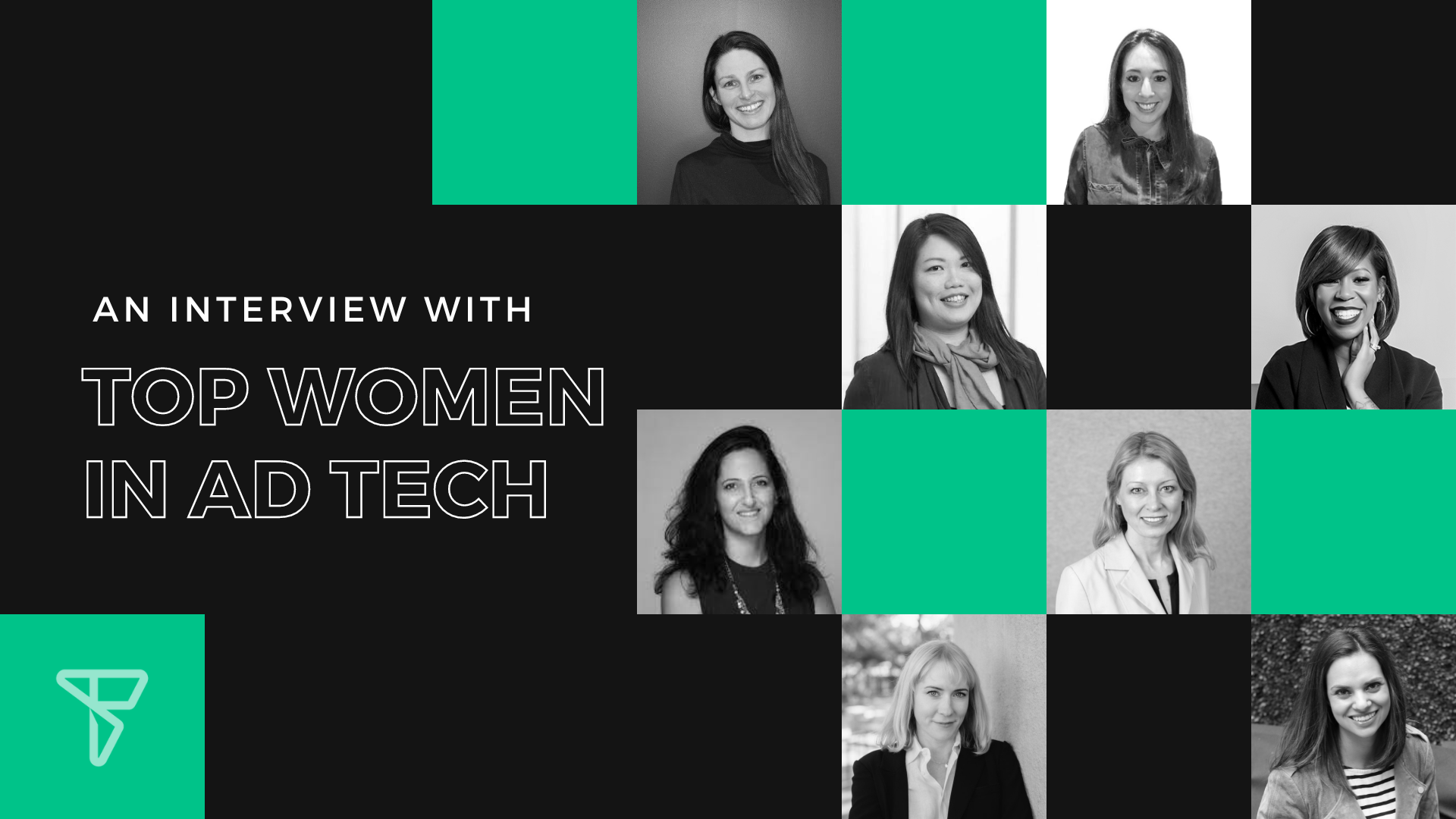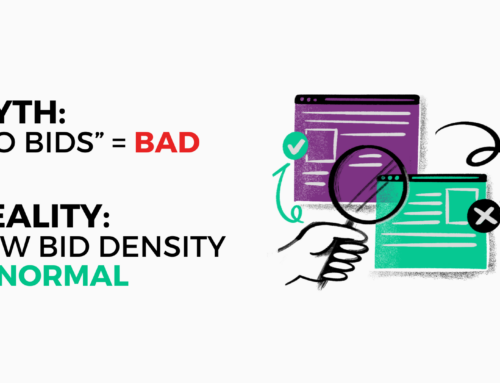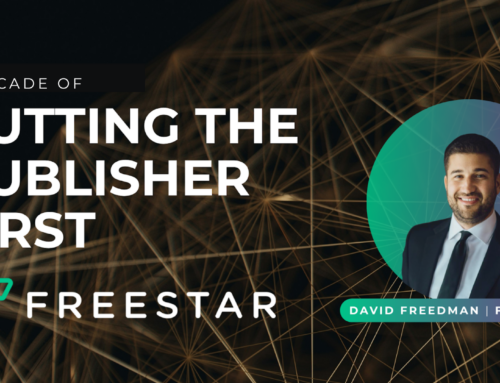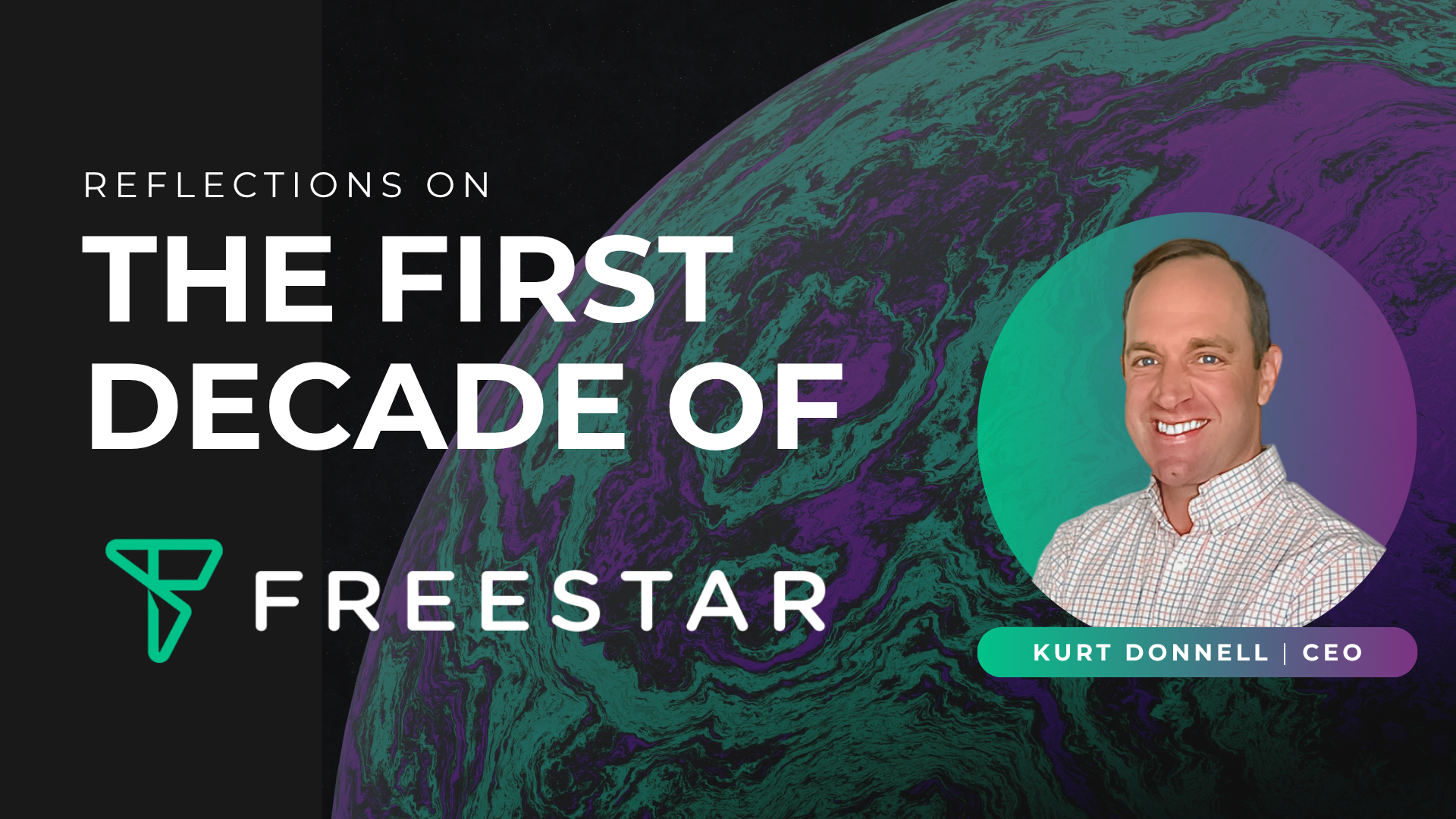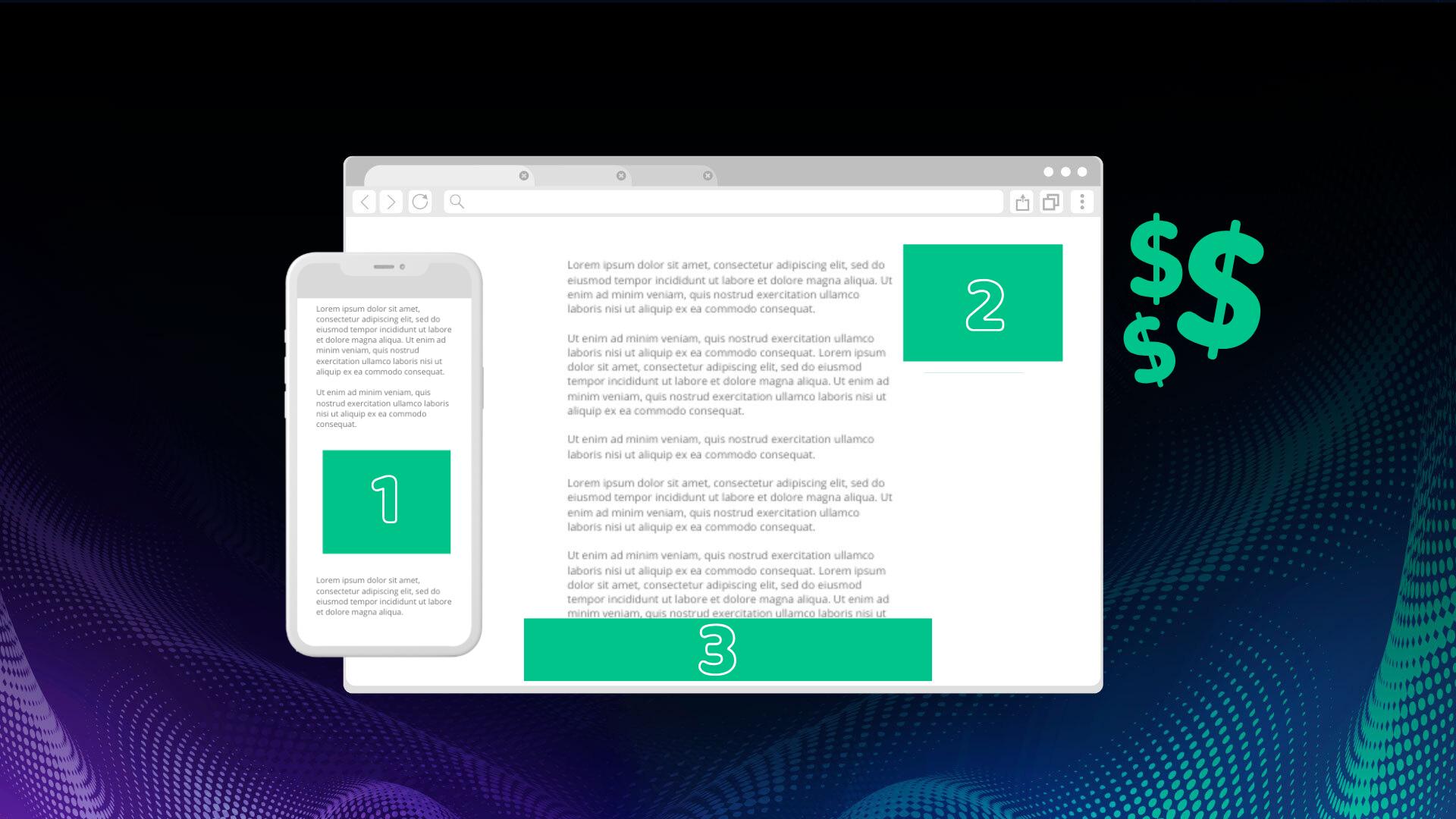In honor of International Women’s Day, we wanted to highlight some of the amazing women in our industry that are paving the way for women in ad tech. In this interview, they share their stories on growing their careers, becoming leaders, and what advice they’d give their 25-year-old selves.
Meet our inspiring leaders:
- Ashley Wheeler, SVP, DV+ Platform, Magnite
- Christina Fiasconaro, SVP, Business Development, Freestar
- Lashanne Phang, Senior Director, Mobile, PubMatic
- Lashawnda Goffin, Founder & CEO, Colossus SSP
- Lior Shvo, VP of Marketing, Primis
- Joanna Burton, CSO, ID5
- Pamela Ibarra, VP, Partner Management, InMobi
- Rikki Decker, Head of Client Services, Blockthrough
How did you start your career in ad tech? How have you grown?
Ashley: When I started my career in ad tech, I took a bit of a risk. And in doing so, I also managed to convince someone to take a risk on me. When I applied for the role at Rubicon Project, I had a little bit of digital sales experience, but virtually no programmatic experience at all, which was a stretch since the role I was applying for effectively required me to be a programmatic consultant to publishers. The hiring manager at the time tasked me with proving to him that I’d be able to learn and grow into the role. He asked me to do some research and write him a 2-3 sentence thesis on the industry and where it was headed. For anyone who works in programmatic, you’ll know that’s a nearly impossible feat to try and summarize an entire industry’s worth of information into a few sentences. So I wrote my 2-3 sentences, and then attached a 6 page, fully footnoted essay to accompany them. I was told I got the role, in part, because I went above and beyond what was asked of me. I learned a lot through that process — namely, to not be afraid of risks and to always go the extra mile when you feel it’s necessary — and I have tried to live by those learnings as I’ve grown in my career
Christina: I started on the TV side of the business right out of college working for Nickelodeon. It was one of the best experiences and where I learned a ton not only about the industry but also about business relationships. My first manager was someone whom I try and emulate in my management style. Her entire goal was to teach me enough to help me get to my next role and that’s exactly what she did. I stayed in the company for 6 years and grew a lot during that time. I was young and naive and made a ton of mistakes. From that time I’ve grown into learning how to handle certain business situations and conversations better. Reactions can determine final outcomes and it’s important to understand how to approach things professionally.
Lashanne: I graduated in IT and have always been passionate about tech industry. When the opportunity came by to consider a career switch from finance industry to ad-tech industry, I took the leap of faith and dove straight into it. I have to say it’s probably the wisest decision I’ve made. The decade worth of business development experience from finance industry was a blessing to ease me quickly into the role in ad-tech. The ever-changing ad-tech industry created constant learnings. With PubMatic, I’ve been fortunate to be given opportunities to grow from regional to global role. The experience is one in a lifetime, enabling me to gain perspective of the nuances from each region, broadening my views and sharpened my strategic mindset.
Lashawnda: My career in ad tech started after touching two specific areas in the programmatic ecosystem. I started off as a trader and then as a seller within a publisher. So in thinking about the next step for me, the best thing was to take what I had done in my previous roles and continue to try new things which is how I entered the ad tech space.
Lior: I began my career 15 years ago as a media planner at UM, a McCann agency. Due to my love of data and technology, I was drawn to the more technical side of digital media. A couple of years ago, I moved into ad tech when I joined Primis to manage Sellers.guide (a free ads.txt cleaning and analysis tool). I soon took over the marketing department management as VP. I grew exponentially as I transitioned to a new industry, new markets. It forced me to step outside of my comfort zone and find new passions.
Joanna: I began my online advertising journey at Asserta Home (now Zoopla) in the marketing department. Since then, I have accumulated 22 years of experience working in the industry across a variety of roles in marketing, PR, and strategy within several different companies including ID5, SpotX, and Rubicon Project.
I was fascinated with the early days of the dot-com boom, with the development of new business models funded by advertising and partnerships. It was interesting to see how, a decade later, the industry changed with the arrival of programmatic advertising, creating increased efficiencies for businesses and enabling the growth of data-driven advertising. A decade on from that, identity, data protection and doing more with less data are driving a new wave of innovation in the advertising business.
I have loved being a part of this never-ending journey. Over the years, I have grown in a multitude of ways as an adtech professional, and it has been nothing short of a fulfilling experience to have made it to where I am today and establishing myself as a respected voice in the space. At ID5, I have had the pleasure of building our initial portfolio of publisher clients as well as developing and spearheading the adoption strategy for our solution.
Pamela: Like many in this field, I tripped and fell into ad tech. My degree is in Creative Writing, so initially my focus was on book publishing (and reading poetry at open mic nights). But there were no jobs in publishing when I graduated, and I had a friend who got me an interview for a temp job at Google. And then unexpectedly I had a career in front of me! Ad tech changes so rapidly, so there’s always new problems to solve. I’ve been hooked ever since.
Rikki: I was very interested in consumer behavior when I started college and ended up pursuing a dual degree in Marketing and Finance with the aim of working in an analytical marketing role. I was introduced to the concept of programmatic retargeting in a college class and was intrigued by the complex and fast pace nature of the digital advertising ecosystem. I landed my first job in AdTech as a campaign manager at Millennial Media, and later moved on to a more analytical trading role at MiQ. My first foray into Customer Success was at The Media Trust, where I had the opportunity to build up an AdTech platform-facing team from scratch.
My focus at Blockthrough has been fostering a consultative approach to partnerships and client services, leveraging Blockthrough’s innovative product insight and my own passion for analytics to forge strong and sustainable client and partner relationships. I appreciate that a career in AdTech doesn’t have to be linear—I’ve had the privilege of working in diverse roles and various organizations throughout the ecosystem and I’ve found that the perspective I’ve gained can always be applied to the next role, no matter how different on the surface. At this point, I find it most rewarding to share my experiences with my team and see how they iterate and apply these learnings in new ways.
When you began your career many years ago, did you ever imagine that you would have a leadership role in this profession/organization?
Ashley: When I first applied to that job posting, I never would have believed that my career at Rubicon Project and now Magnite would have evolved as it has. I remember feeling so incredibly grateful for that first role, and so excited to be a part of such a dynamic, ever-changing industry. In that moment, I think I tasked myself more with understanding ad tech inside and out, and proving to my hiring managers that the faith they put in me at the start was the right choice to make. In a lot of ways, I still feel that way. Leadership wasn’t necessarily what I was aiming for at the start of my career, but was rather a more organic consequence of throwing myself into the ad tech landscape and trying to figure it out from the ground up, and then wanting to help others do the same.
Christina: Never. Quite frankly I expected to be a stay-at-home mom once I started a family. It never really seemed like there was the option to do both. I assumed I had to give up whatever career I built to be there for my children. Because of that, I always focused on being an individual contributor in a sales role. I wanted to make as much money as possible while I could and build a reputation and foundation that would allow me to come back to a role once I had a steady family life.
Lashanne: There is certainly the desire to grow into a role that enables me to contribute beyond an individual contributor. However, the discovery of leadership elements came along the way.
Lashawnda: No, that was not the intention. Initially, the opportunity was geared towards traditional sales but after further conversations with Mark Walker, our co-founder of Direct Digital Holdings, we were able to create a leadership role at Colossus SSP that allowed me to deliver on the strategic objectives to rebuild the company from the ground up. This leadership role has grown over time and allowed me to evolve my career by pulling from my experiences across strategy, business development and sales.
Lior: Yes. As my mom always told me, “Do everything you do to the best of your ability”. This motivated me to grow, to move on. Everywhere I go to, I want to excel in what I do and do it the best way possible.
Joanna: If I wanted a position of leadership, I knew that I was certainly going to have to work for it, and that’s exactly what I did! As well as putting in the elbow grease, I made sure that I was present at every key industry event, speaking to other professionals, building my contact list, essentially getting myself noticed and remembered. Today, I have strong connections and friendships across the industry in multiple markets, and this has been a real contributor to some of the great opportunities I have landed throughout my career.
Pamela: No? I was sort of shocked to be there in the first place, around so many smart and interesting people. It was a few years before I even realized there was a ladder, and a path up.
Rikki: I didn’t necessarily imagine it but I definitely aspired to a leadership position. I grew up watching small business owners in my family–my grandmother has owned and managed a hair salon for 35 years and my father has maintained an independent consulting business for over 20 years. I saw them forge ahead with tenacity and drive in the face of the unknown. I sought to follow in their footsteps and eventually be in a position to help build and optimize a business from the ground up.
What motivated you to step up and become a leader?
Ashley: I was very fortunate to have a wonderful mentor and role model as my own manager for a large portion of my tenure at Magnite. I saw first hand the impact a good leader can have on someone’s personal and professional development and their commitment to a company. In many ways she encouraged me to take on new challenges in my career and inspired me to want to help foster others as she helped foster me.
Christina: Once I realized I could balance a family and a career, I knew I wanted to lead. I found that I got more out of work when I was helping someone. I started quickly learning the jobs I was in and being that person that people would come to when they had questions and that was my favorite part of the day. It’s exciting to watch someone succeed with a piece of advice or tip that you shared with them. It became more exciting than my own wins. Not only that but being an advocate for a team and helping in making their roles easier with cross-departmental discussions is very rewarding.
Lashanne: The feeling of winning as a team has been a fueling mechanism and affirming the commitment to lead. Being able to work as a team, share knowledge, mentor young talent, and develop winning strategies together are big motivations.
Lashawnda: I had some amazing female leaders in my previous roles and looking at how much they poured into me, I knew that it was my turn to do the same thing. I also knew that being in this role with a certain kind of power, I didn’t want to take it lightly. I have the opportunity to introduce other people to this space, and I really enjoy being able to help the next generation who could give those chances to others.
At Colossus SSP, we’ve been able to really grow a successful organization with individuals that were hungry and really have the yearning and tenacity to deliver.
Lior: Influence and recognition are two of my strongest motivations. When my work doesn’t have a real impact on business and people don’t see it, my inner fire dies. Both motivations are fulfilled best in leadership roles. I also knew that if I saw something done wrong and wanted to change it, I had to take my seat at the table and do it myself.
Joanna: I am passionate about the industry I am in. When digital media began I found it incredibly compelling, and I wanted to be a part of it. My goal of moving into a position of leadership was so that I could drive real change in an industry that I love. I also wanted to inspire others to find passion in their work, as well as mentor young women to achieve the best of their ability in their careers as well.
Pamela: I’ve always had a leader persona. In elementary school, I would invent clubs and little societies (like I hated packing my own lunch in fourth grade, so I convinced all the girls in my class to empty their lunches onto the table, and we’d all share and make fun concoctions. Tuna with BBQ chips on top! Salami wrapped around carrot sticks! It became a thing.) I taught children’s classes, coordinated a youth dance summer trip to El Salvador, elected class Vice President – all that stuff. However, even with natural tendencies, you still need to advocate for a leadership role, especially the first one. My first management role was at a new company that was skeptical about hiring someone who didn’t bring a track record of manager success. I had to advocate for myself – all my professional and personal experiences – to tip the scales. Of course, there is always the aspect of the right place/ right time.
Rikki: I’m the oldest of 3, and my siblings would tell you that I’ve had a lot of practice. I love having the autonomy to build processes, streamline workflows, and coach colleagues and I felt that a leadership position would be the best opportunity to pursue these passions.
What are the benefits of having women in leadership?
Ashley: Within any organization, it is beneficial to have a number of diverse perspectives that can contribute to the overall strategy and introduce unique ways of thinking. Women in leadership add to that diversity.
Christina: It’s really important to have women leaders in a company. There is a perspective that is different from men and can really make a difference in decisions that affect an entire organization. I’ve had a few women managers and leaders who I could look to as examples for myself, but the ones I’ve had made so many more things seem possible for my own future. For me, it’s important to show women balancing work and family. There is a ton of pressure as a mother and what that should look like, and even more pressure as a working mother and what that means to your commitment at the office. When young women see women leaders seemingly accomplishing everything they want in their own careers, it gives a real sense that it’s possible and builds confidence in those young women that they, too can accomplish anything they want.
Lashanne: Many women leaders I know are great at multi-tasking and highly organised. They are meticulous and have strong analytical minds. They are rational and compassionate. They are focused and determined. Having these elements as a leader enabled women leaders to efficiently work with a wider spectrum of profiles.
Lashawnda: Diversity and equality are one of the founding pillars here at Colossus SSP. I’m proud to be a part of an organization that recognizes the disparity and takes action and onus to do something about it! Having women in leadership roles not only helps bring balance in decision-making or diversity of thought but provides opportunities for mentorship to the next generation.
Lior: One of the biggest benefits of being a woman in leadership is that other women can look up to you and believe that they can also reach that position. In addition, it creates a societal change; women who lead create a much more equal home with their partners. The partners take a larger role in raising the kids, performing house chores, and so forth.
Joanna: Having women in leadership roles gives professional women a voice and establishes the position they deserve in the workplace – it’s fulfilling to see more and more women in C-level roles, which was rarely the case in the past. In turn, this also influences the positive development of more diverse workplaces and inspires those from all different backgrounds to aim for roles that they may have previously stayed away from.
Pamela: Women in leadership in many cases still set precedents. It says to other women that it is possible to reach higher. And there are a million studies about how diversity of all kinds (gender and race) increase revenue and performance in companies. Statistically women do better in school, graduate in higher rates, have higher GPAs, get higher degrees, yet we do not hold an equal rate of leadership roles, C-suites or on board seats. So we have some work to do.
Rikki: In interfacing with decision makers within client organizations and being a decision maker in my own organization, I’ve found that awareness of differing perspectives is critical to problem solving and ensuring sustainability for desired business outcomes. Because of this, I highly value cross-functional teamwork. On a tactical level this typically involves collaboration between stakeholders within different business functions. However, individuals are more than just the role they are fulfilling at the moment. Employees bring their whole identities to work, and embracing that provides an opportunity to leverage differing perspectives as they relate to communication and relational intelligence.
A lack of women in leadership leads to a gap in perspective, which becomes an opportunity cost for an organization. It would be an obvious risk to allow a single department to make all the decisions for a given organization without input from other departments. By the same token, I see it as a risk to allow a single demographic to unilaterally make decisions for an organization.
Seeing women represented in leadership can help to inspire the next generation. I’ve found it incredibly inspiring to see more senior women in the industry leading in a way that feels authentic to them, regardless of if it matches the precedent laid before them.
What advice do you have for women looking to grow in their career?
Ashley: My advice adheres closely to the things I learned when I initially started my career in ad tech — take risks, don’t be afraid to push yourself out of your comfort zone, and when in doubt, always try to go the extra mile.
Christina: Never doubt yourself. Always ask the question. Remember that when you are pursuing something in your career, it’s never a no, it’s a not yet. Keep working at it, and you will get there.
Lashanne: My advice for women is to be true to yourself and be confident in sharing your opinion objectively. Maintaining the desire to learn, advance and give back.
Lashawnda: You have to be your biggest cheerleader. Often, we are our biggest enemy. We critique ourselves the most and pull everything apart. Secondly, you also have to be the one to take control of the trajectory of your career.
Lior: Embrace change without fear. It is through change that we grow and become stronger. No matter what happens, you will learn so much about yourself from it, even if you fail.
Joanna: As mentioned, growing my list of contacts has been a true benefit to my career. My advice to women aiming to grow in any industry is to make yourself known: go to events, reach out to those you admire, create a presence on social media, and do your research. All of these tips will contribute to you making a name for yourself and getting noticed.
Pamela: Identify your strengths and lean into them. Capitalize on what comes easily and where you shine. And seek feedback honestly and often.
Rikki: I would encourage women looking to grow in their career to leverage their network as much as possible. It can be easy to fall into the trap of imposing unfair self-criticism. In my experience the best way to combat this is to have trusted advisors that you can check in with to help validate your strategies. Building confidence is an important foundation for leadership, and getting an objective understanding of your current strengths and opportunities for growth are key to building that confidence.
Finally, what advice would you give your 25-year-old self?
Ashley: Probably to trust myself more. I questioned myself a lot when I was in my 20s and often those doubts would prevent me from speaking up and offering my perspective on things. Confidence eventually came with maturity, but if I could go back in time, I definitely wish I could have accelerated that process for myself.
Christina: I would tell her to enjoy that body of hers because she will never see it again after kids. Kidding (ish). I would tell her that there are a lot of really good things to come and not to dwell on the mistakes or the bumps. There’s a lesson in each of them that will add to your growth and turn you into the leader you will end up wanting to be in the future.
Lashanne: Taking the leap of faith – especially after researching and analysing, your instinct still says yes. I’ve learnt over the years, contemplating made me missed many good boats!
Lashawnda: Give yourself a little grace. I think we put a lot of pressure on ourselves to get it right. We need to realize that we can course correct and by doing so, we can remove that bit of the stress. When we’re 25, we think we know it all, but in reality, we’re just starting our careers.
The other piece of advice I would offer is to take chances. It’s hard especially when you are in an entry-level role, and you’re around colleagues that are seasoned – there’s always a comparison. Sometimes we need to make those tough decisions that are uncomfortable and move on to try something new.
Lior: Conflicts should not be feared. Starting my career, I was afraid to voice my opinions to defend my place. I was once told that when you think about a conflict, think of a match and a matchbox; their conflict creates fire, energy, which has an endless potential to do great stuff.
Joanna: My top piece of advice for my 25-year-old self would be to remain open to change. It is impossible to grow by remaining stagnant. I have been fortunate enough to be part of some amazing opportunities and experiences, and many of those wouldn’t have happened without me being willing to say yes to shifts and deviations in the road I had set out for myself. It’s important to take risks to allow for your continuous evolution.
Pamela: Work hard. Don’t take it all too seriously. Also, start wearing a blazer to work. Those jeans and tee shirts are not giving “promotion candidate” to your superiors.
Rikki: A mentor of mine often told me “don’t let the perfect get in the way of the good!” and that has stuck with me ever since. I would encourage my 25-year-old self to take career risks and not be afraid to take on challenges outside of my current skill set or comfort zone. No matter the outcome, there’s always a lesson on the other side.
As we learned from this interview, the incredible women in our industry in leadership are inspiring and truly disrupting all corners of our industry and are constantly sending the elevator back down to elevate the next group of women. For International Women’s Day and Women’s History Month, consider supporting a female-owned business, donating to a women’s nonprofit, or even sending a message to a woman who inspires you.

